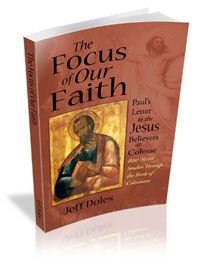To this end I also labor, striving according to His working which works in me mightily. (Colossians 1:29)
Paul’s purpose in preaching the good news about Jesus was to present everyone perfect in Him. Everything in him was focused on that goal. This little verse is loaded with the power by which he went about that work. “To this end I also labor, striving according to His working which works in me mightily. “To this end I also labor, striving according to His working which works in me mightily.”
- The Greek word for “labor” means to toil to the point of fatigue.
- The word for “striving” is agonizomai, which is where we get our English word “agony.” We often think of it as intense pain, but Paul is actually talking about intense effort.
- The word for “working” is energeia, from which we get the English word “energy.” It is the ability or strength to operate efficiently and get things done.
- The word for “work” is the verb form, energeo.
- The word “mightily” actually translates two words that are more literally rendered as “in power.” The Greek word for power is dynamis. When Paul uses it, it is almost always about supernatural power and usually about the miraculous power of God.
And my speech and my preaching were not with persuasive words of human wisdom, but in demonstration of the Spirit and of power, that your faith should not be in the wisdom of men but in the power of God. (1 Corinthians 2:4-5)The energy that worked in Paul so powerfully was not just for him but is available to every believer in Jesus. For it is the His power, the power by which He did so many miraculous things. Indeed, it is the power that raised Him from the dead and seated Him at the right hand of the Father. It is the power of the Holy Spirit, which He promised to the Church at Pentecost (Acts 1:8). Paul prayed for the believers at Colosse that they would be “strengthened with all might,” according to this glorious power” (Colossians 1:11). It is power of Jesus living in them — and us! — as well as in Paul.
For the kingdom of God is not in word but in power. (1 Corinthians 4:19-20)

The Focus of Our Faith
Paul’s Letters to the Jesus Believers at Colosse
Bite-Size Studies Through Colossians
by Jeff Doles
Preview with Amazon’s “Look Inside.”
Available in paperback and Kindle (Amazon), epub (Google and iTunes) and PDF.




















